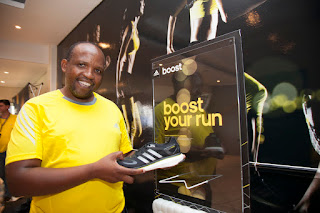 |
| The ispo 2013 February sports retail trade show |
This year’s
ispo was the biggest ever, with both visitor and exhibitor numbers on the rise
While national shows around the globe are suffering
due to the economic downturn, the ispo show keeps growing every year. The
recent growth can be attributed to the trend that in tough times people start
to re-evaluate their business and look to focus on different brands that might
do better for them, suggests Tobias Gröber,
business unit leader for the show organisers, Messe München International.
 |
| Tobias
Gröber, business unit leader for Messe München International business unit II |
The 2013
ispo Munich show, which ran 3-6 February, saw more than 81 000 visitors
attending from 109 countries – a four percent growth from 2012.
There was
also an increase in exhibitor numbers. This year visitors could visit 2 481
exhibitors from 52 countries, while in 2012 there were 2 344 from 51
countries. With the increase in exhibitors, the exhibition space also increased
by 430m2 to 103 220m2.
Out of
interest, in 1970, at the first ever ispo show, there were 816 exhibitors from
25 countries covering 45 000m2 of exhibition space. It
attracted 10 777 visitors from 34 countries.
The majority
of this year’s exhibitor growth came from the outdoor, fitness, performance and
sportstyle categories.
While
sourcing companies are an essential component of the industry, they are
purposefully limited to two halls. This year the other 14 halls were taken up
by action sports (three halls), outdoor (three halls), sport style (two halls),
ski (two halls), and performance, ispo Vision, health/fitness and
textrends/BrandNew (one hall each).
The biggest
increase of visitors were those from Europe and Asia (66% of visitors came from
Italy, Austria, Switzerland, France and Great Britain). Of all the visitors,
around 35% came from the host country Germany. It is significant is that there
were quite a lot of French visitors, which is unusual says Gröber. “They don’t usually travel
outside of their country to attend shows.”
He
attributes the increase in French visitors to ispo’s network of people working
in various countries. They set up an info centre network, consisting of people
with a history of working in each country’s industry – people who understand
the challenges and how the industry operates, as each country is often unique
in how they tackle problems.
Internet no obstacle to trade show
Ispo has grown in popularity despite the easy
communication offered by the internet.
In the past, before the widespread availability of
information on the internet, companies had very little choice but to exhibit at
trade shows in order to show other companies their products or new technologies
that they have developed. Today, with a press of a button businesses from all
over the world can connect with each other through email and the internet.
The internet lacks one vital component that makes for
a good business relationship: personal face-to-face relationships. This is
quite probably one of the reasons why the stands with the after-show drinks are
often so popular.
It is also sometimes difficult to filter out the information
online – to get to the pieces of information that you are looking for, that is
sometimes hidden in between other that is less relevant. By talking to a person
at a trade show, you can have a live demonstration and feel of the product,
which is not as easy in an online relationship, he explains.
Networking
Messe München
International decided a few years ago to rethink what they offer through ispo.
The result is that ispo has changed from a four day trade show, to a 365 days a
year networking service - a network of services designed to assist businesses.
“We are no longer a BTB service,” says Gröber. “We are a BTB-to-C service, assisting businesses to reach
not only each other, but also the consumer.”
The services are not only for select members of the
trade. They are there to connect every person who earns money in one form or
another through sport, for example coaches, resorts that offer sport, event
organisers, companies that invest and sponsor sport events, etc.
People are kept connected and informed - both online
and offline - through various channels, for example, through ispo’s newsletter
and magazine.
They also offer a networking service, through which
companies can make use of ispo’s extensive database to make connections. For
example, if a brand wants to find a distributor in a new country, they can book
a tailor-made service where ispo will make a customised search on their
database for the type of company that they would want to do business with,
based on a profile specified by the brand.
Alternatively, a company can make use of the online
ispo Connect to make new contacts. Both exhibitors and visitors to the ispo
show benefit from ispo Connect – before, during and after the show.
The recently launched ispo Jobs has proven to be
popular. The platform allows companies to post jobs and individuals to search
for positions.
They also help promote new companies through the
BrandNew Awards. In addition to the coverage that they receive while at the
ispo show, the winners are also supported post-show by ispo through the
marketing material that ispo makes available for the companies and retailers to
use.
The ispo Munich 2014 trade show will be held 26-29
January.
Published by
www.sportstrader.co.zaLabels: fitness, ispo 2013, outdoor, performance, sport trade show, trade show































